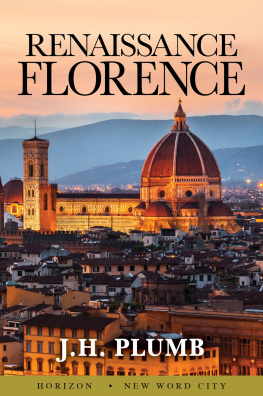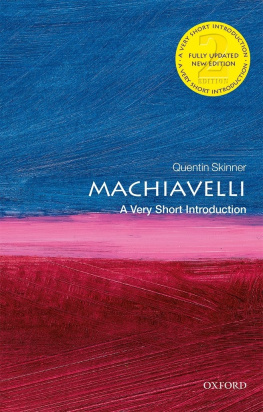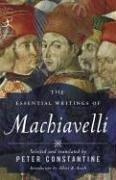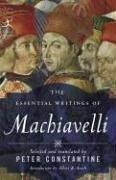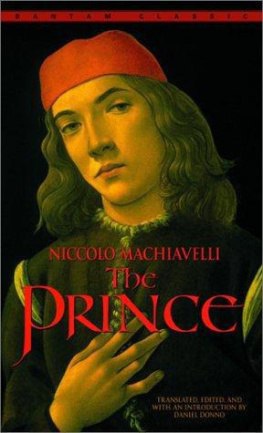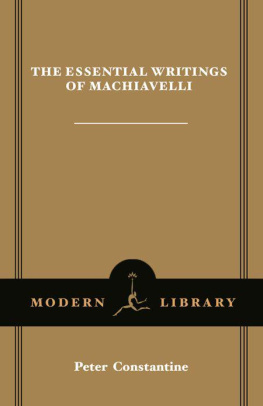Florentine
Political Writings
from Petrarch
to Machiavelli
Florentine
Political Writings
from Petrarch
to Machiavelli

EDITED BY
Mark Jurdjevic,
Natasha Piano,
and
John P. McCormick

A volume in the Haney Foundation Series, established in 1961
with the generous support of Dr. John Louis Haney.
Copyright 2019 University of Pennsylvania Press
All rights reserved. Except for brief quotations used for purposes of review or scholarly citation, none of this book may be reproduced in any form by any means without written permission from the publisher.
Published by
University of Pennsylvania Press
Philadelphia, Pennsylvania 191044112
www.upenn.edu/pennpress
Printed in the United States of America on acid-free paper
1 3 5 7 9 10 8 6 4 2
A catalogue record for this book is available
from the Library of Congress.
978-0-8122-2432-0
In Memory of Ronald G. Witt
I think something has been true and is true
in this city more than in any other; the men
of Florence especially enjoy perfect freedom
and are the greatest enemies of tyrants.
Leonardo Bruni
Contents

Mark Jurdjevic
MARK JURDJEVIC
Dante famously pathologized the incessant mutability of Florentine culture as a bedridden sick woman vainly attempting to ease her pain by constantly shifting position. Students of political culture, however, have been drawn to medieval and Renaissance Florence precisely because of what the medieval poet condemned as a tragic deviation from the pacific and timeless ideal of universal Christian monarchy. From our perspective, the citys conflicts add up to more than the sum of their parts. In the intensity of Florentine factionalism and the frequent alterations in its political institutions lay a larger inquirymore experiential and improvised than theoreticalinto the nature of political legitimacy and the relationship between authority and its social context. In this respect, Florence was both exceptional and typical of Renaissance political culture. As Dante rightly observed, Florentine political life was particularly unstable, but throughout Italy the emergence of communes and city-states in the collapse of papal and imperial power led to similar experiments in political legitimacy, constitutional configurations, and competing bids for power from newly empowered urban classes.
This volume provides a selection of political textslargely but not exclusively Florentinethat illustrates the language, conceptual vocabulary, and issues at stake in Florentine political culture at key moments in its development. The volume opens in the mid-fourteenth century with the letter of Petrarch (Francesco Petrarca) to Francesco da Carrara, the ruler of Padua, on the nature and duties of the ideal prince. A quintessential example of the widespread mirror-for-princes genre (speculum principis) by the most influential humanist of his day, Petrarchs advice to the lord of Padua demonstrates how late medieval Italians argued for the advantages and legitimacy of princely rule. Two texts by the early humanist Coluccio Salutati and the jurist Bartolus of Sassoferrato further explore the nature of monarchical government through an analysis of tyranny, monarchys corrupt counterpart. Texts by two leading fifteenth-century humanists, the Florentine chancellors Leonardo Bruni and Poggio Bracciolini, celebrate the republican constitutions of Florence and Venice in a context of increasing aristocratic domination of politics. Their texts demonstrate the way in which humanisms emphasis Not all humanists deployed their learning on behalf of those in power, however. De libertate, a text by Alamanno Rinuccini, demonstrates how classical ideasin particular an exhortation to a life of Platonic withdrawal and contemplationcould become a bitter form of protest against the degree to which the Medici had subverted republican self-rule in Florence. Fifteen years after Rinuccini lamented the corruption of Florentine government, the French king Charles VIII invaded Italy, triggering a half century of peninsular warfare between Spain, France, and the Holy Roman Empire that permanently altered the political context in Florence and Italy.
The remainder of the texts in this volumenone by humanists, strictly speaking, but by thinkers nevertheless deeply immersed in the literature of antiquity and inconceivable without the Florentine humanist settingwere all composed in this context of heightened instability and all directly or indirectly address its implications. The first text is a constitutional proposal for the Florentine government by the Dominican friar Girolamo Savonarola, the most accomplished theologian of his day and consequently widely admired in the citys humanist circles in spite of his fiery sermons expounding on the immorality of pagan writers. Savonarolas treatise robustly championed a more popular and inclusive variety of republicanism that had distant precedents in Florentine history but had been more recently undermined in the fifteenth century by the Florentine elite and the rise of the Medici. Like Rinuccini, Savonarolas treatise had a subtext that associated the Medici family, who had been ousted from the city in 1494, with tyranny. The next text, written by the Florentine ottimate Paolo Vettori, addressed the Medici family at the moment of their triumphant return to Florence in 1512, advocating that they adopt a de facto princely regime based on force. The remaining texts were all written by the two greatest political theorists of the Renaissance, Niccol Machiavelli and Francesco Guicciardini. The texts selected (several of which are translated into English for the first time) are all formally prescriptive: constitutional recommendations for the ideal configuration of the republic and for the stable integration of Medici power within it, technical analyses of electoral techniques and procedures, and complex mechanisms for harmoniously integrating the citys competing social groups. They reveal a lesser-known aspect of the two thinkers intellectual preoccupations, both famous for other writingsMachiavelli of course for The Prince and Discourses on Livy and Guicciardini for his monumental history of Italy. Here we see them less as the grand sages of Renaissance political thought engaged in timeless dialogue with the canon and more as political artisans, intensely working on the technical aspects of Florentine politics, fine-tuning the citys constitution with tools furnished by their experience and sharpened by their formidable intellects.
In the early Middle Ages, the political units of the Italian peninsula fit relatively clearly into the prevailing political schema. In the south, the Kingdom of Naples was a natural monarchy much like those north of the Alps, and the myriad city-states that dotted central and northern Italy were all theoretically subject to either pope or emperor. Many towns were supervised or ruled outright by papal or imperial vicars, and up and down the peninsula Guelf (pro-papal) and Ghibelline (pro-imperial) parties vied for power. The fact that these families valued theoretical imperial investiture long after they had already established themselves in power without making any reference to it whatsoever demonstrates the pan-European durability of the model of universal monarchy.
Next page

